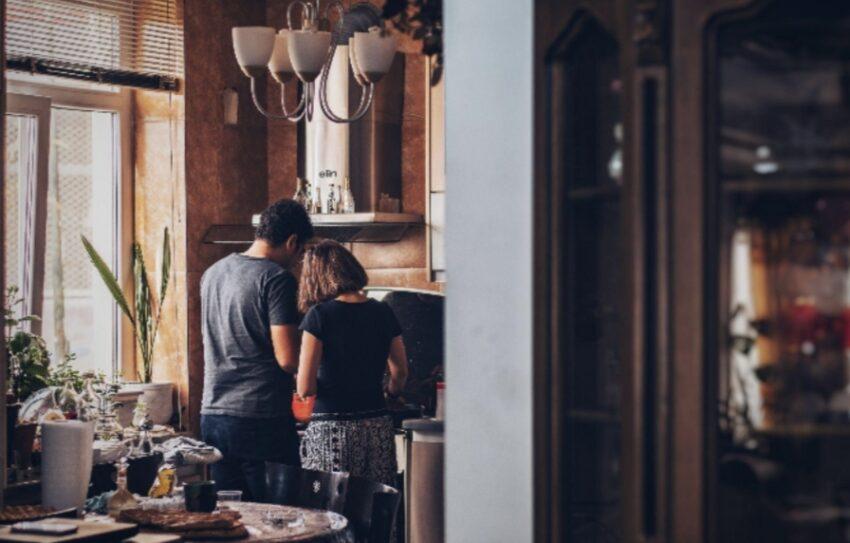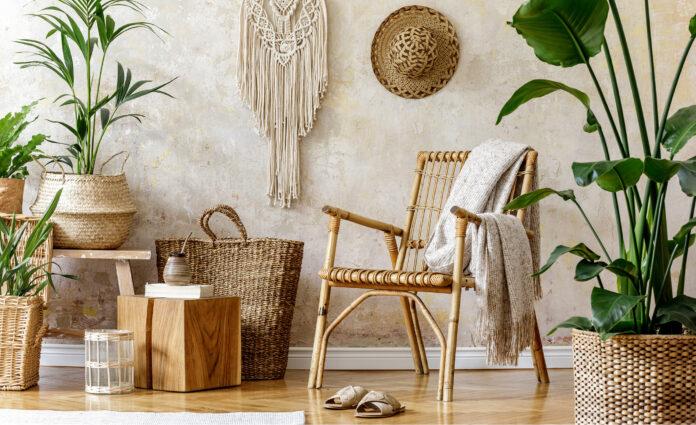The trend of using earthy tones and ecological décor has gained traction in the effort to create houses that reflect a harmonious relationship with nature.
Incorporating natural components into your living area to create a peaceful and environmentally conscious ambiance is a skill that this article explains. Find out how to turn your house into a balanced, well-being refuge by using earthy colors and eco-friendly decorating concepts.
The Natural Color Palette:
Foundations that are neutral:
- Begin with a muted color scheme that draws inspiration from earthy tones like warm grays, taupe, and beige.
- These colors provide a calm background that accentuates the beauty of nature.
Verdant Accents:
- Use indoor plants or décor to add touches of greenery.
- In addition to providing freshness, indoor plants can inspire a sense of nature.
Wooden Parts:
- Use hardwood furniture or accent items to give your home warmth and a natural feel.
- To go green, use sustainable or reclaimed timber.
Inspiration for Eco-Friendly Interior Design:
Repurposed furnishings:
- Recognize the appeal of vintage furnishings.
- Give abandoned items new life by repurposing old doors as statement pieces or turning wooden crates into coffee tables.
Textiles Made of Natural Fibers:
- Opt for natural fiber materials such as hemp, linen, or organic cotton.
- These materials are less harmful to the environment in addition to seeming opulent.
Reusable & Recycled Decorations:
- Use recycled materials to create décor, such as metal, glass, or reclaimed wood.
- In order to create a sustainable kitchen, highlight reusable products like bamboo cutlery or glass jars for storage.
Open, Airy Spaces:
Natural Lighting
- Increase the quantity of daylight entering your home.
- To let natural light flood your living area, use light-colored, airy window coverings.
Shelves that are open:
- Think about installing open shelves in the living room or kitchen.
- A feeling of transparency and connection to nature is fostered by showcasing beautiful and environmentally friendly objects.
Design that is biophilic:
- Adopt the concepts of biophilic design by utilizing organic materials and designs.
- To create a soothing and natural ambiance, use textures that are inspired by nature, such wallpaper with wood or stone patterns.
Air Purifiers for Ecological Living:

One thing to keep in mind while designing a sustainable and nature-inspired house is the significance of keeping indoor air pure. In order to maintain a healthy living environment, air filters are essential, and there are environmentally friendly choices available:
Organic Fiber Filters:
- Choose air filters composed of natural materials like bamboo or cotton.
- The environmental effect of conventional synthetic filters is lessened by these biodegradable filters.
Reusable Filters:
- Think about purchasing reusable and washable air filters.
- The quantity of trash produced by disposable filters is decreased by the ease of cleaning and reusing these filters.
Power-Saving Air Purifiers:
- Select air purifiers with lower energy consumption.
- To be sure the models fulfill sustainable criteria, look for those with eco-friendly certificates.
Introducing Nature Indoors:
Vertical Garden or Living Wall:
- To bring the outside inside, install a vertical garden or living wall.
- This enhances the interior air quality in addition to adding a little greenery.
Accents made of natural stone:
- Include aspects of natural stone in your interior design.
- Stone’s ageless beauty strengthens one’s bond with the land, whether it is used for worktops or accent walls.
Earth-inspired Art:
- Select pieces of art that capture the splendor of nature.
- A hint of organic beauty can be seen in images, paintings, or sculptures that draw inspiration from natural settings and materials.
Do It Yourself Sustainability:
Repurposed Art Initiatives:
- Take on do-it-yourself art projects with repurposed materials.
- Repurpose objects that might otherwise wind up in landfills to create unique wall art, vases, or even furniture pieces.
Handcrafted Cleaning Supplies:
- Convert to a sustainable lifestyle by producing your own cleaning supplies.
- For efficient and eco-friendly cleaning solutions, use basic items like vinegar, baking soda, and essential oils.
Essentials for a Reusable Home:
- Invest on reusable substitutes for commonplace goods.
- To reduce single-use waste, replace paper towels and other throwaway goods with reusable cloths and refillable containers for household supplies.
Scents Inspired by Nature:
Essential Oil Receptacles:
- Use essential oil diffusers to fill your house with aromas inspired by the natural world.
- Choose aromas that are peaceful and refreshing, such as citrus, lavender, or eucalyptus.
Natural Candles:
- Choose candles manufactured with natural ingredients, such as beeswax or soy.
- Not only do these candles burn cleanly and create a mild, natural smell, but they help reduce indoor air pollution.
Dried Herbs and Flowers:
- For a hint of nature, adorn your room with dried flowers and herbs.
- Put them in vases or make potpourri to add scent and visual appeal to your eco-friendly décor.
Eco-Friendly and Communal Practices:

Regional and Ecological Craftspeople:
- When you add to your home’s decor, support sustainably and locally produced craftsmen.
- Handmade items from regional artisans frequently tell distinctive tales and enhance the wellbeing of the neighborhood.
Brands of Eco-Friendly Furniture:
- Pick furniture manufacturers that are dedicated to environmentally sustainable methods.
- For wooden furniture, look for certificates such as FSC (Forest Stewardship Council) or labels that list recycled components.
Plant exchanges and communal gardens:
- Take part in plant exchanges or community gardening.
- By lowering the need for fresh plant purchases, sharing plants encourages ecological habits in addition to fostering a feeling of community.
While you’re all for earthy colors and eco-friendly décor, take into account some other factors: doing do-it-yourself sustainability projects, making smells inspired by nature, and encouraging eco-friendly activities in your neighborhood. Not only is the path to a more sustainable house rewarding, but it also advances the worldwide endeavor to protect and value our planet. Savor the process of building a house that reflects the responsibility and beauty found in nature. #hydnews #Khabarlive







